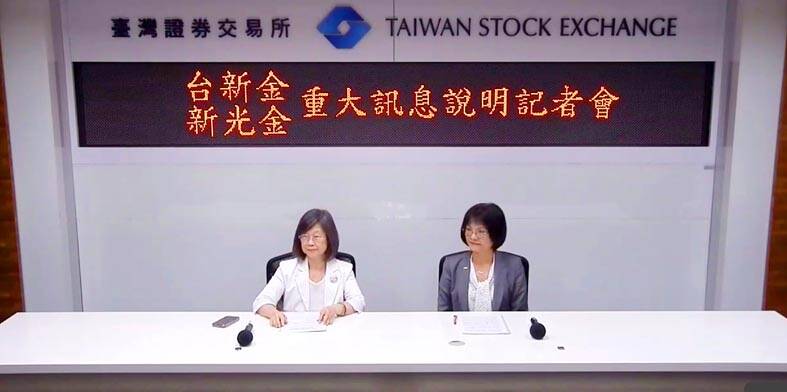Taishin Financial Holding Co (台新金控) yesterday secured a merger agreement with Shin Kong Financial Holding Co (新光金控) via share swaps, despite lingering uncertainty over a hostile takeover bid by CTBC Financial Holding Co (中信金控) on the open market.
Bank-focused Taishin Financial and life insurance-focused Shin Kong Financial announced the agreement, although it still needs Financial Supervisory Commission (FSC) approval and a green light at their respective shareholders’ meetings, while CTBC could press ahead with the buyout attempt.
“The consolidation would be carried out fully via share swaps and would benefit both Taishin and Shin Kong,” Taishin Financial chief financial officer Carol Lai (賴昭吟) said at a news conference at the Taiwan Stock Exchange in Taipei last night.

Photo: Wu Hsin-tien, Taipei Times
Taishin Financial plans to issue new ordinary shares for Shin Kong Financial shares, with a share swap ratio of 0.6022 Taishin Financial common shares for one Shin Kong Financial common share, while one Taishin Financial preferred share for each Shin Kong Financial preferred share, Lai said.
The companies would put the proposal to their shareholders on Oct. 9 and then set a date for the merger after receiving regulatory approval, she said.
The two conglomerates have little overlapping businesses and the merger would make the combined entity Taiwan’s fourth-largest financial service provider based on assets, Lai said.
After the merger, Shin Kong Financial will become part of Taishin Financial, though the new entity will be renamed Taishin-Shin Kong Financial Holding Co (台新新光金控).
Shin Kong Financial, a laggard among its peers in terms of profitability, has expressed interest in merging with other conglomerates, and Taishin Financial was believed to be the most likely buyer, given that its chairman, Thomas Wu (吳東亮), is the younger brother of former Shin Kong Financial chairman Eugene Wu (吳東進).
Taishin Financial has pledged to retain all Shin Kong employees after the merger, which it said would bolster their mutual banking, life insurance and securities businesses.
CTBC Financial, which has deeper pockets, on Tuesday said that it aims to grow into a large international player as it plans to launch a tender offer to acquire Shin Kong Financial on the open market.
The company would become Taiwan’s largest financial service provider if it were to acquire Shin Kong Financial, it said.
The FSC has sought to stay neutral by repeating that all acquisition deals must be conducted in compliance with legal requirements without harming market order or stability, and do not compromise the interests and rights of shareholders.

CHIP RACE: Three years of overbroad export controls drove foreign competitors to pursue their own AI chips, and ‘cost US taxpayers billions of dollars,’ Nvidia said China has figured out the US strategy for allowing it to buy Nvidia Corp’s H200s and is rejecting the artificial intelligence (AI) chip in favor of domestically developed semiconductors, White House AI adviser David Sacks said, citing news reports. US President Donald Trump on Monday said that he would allow shipments of Nvidia’s H200 chips to China, part of an administration effort backed by Sacks to challenge Chinese tech champions such as Huawei Technologies Co (華為) by bringing US competition to their home market. On Friday, Sacks signaled that he was uncertain about whether that approach would work. “They’re rejecting our chips,” Sacks

It is challenging to build infrastructure in much of Europe. Constrained budgets and polarized politics tend to undermine long-term projects, forcing officials to react to emergencies rather than plan for the future. Not in Austria. Today, the country is to officially open its Koralmbahn tunnel, the 5.9 billion euro (US$6.9 billion) centerpiece of a groundbreaking new railway that will eventually run from Poland’s Baltic coast to the Adriatic Sea, transforming travel within Austria and positioning the Alpine nation at the forefront of logistics in Europe. “It is Austria’s biggest socio-economic experiment in over a century,” said Eric Kirschner, an economist at Graz-based Joanneum

BUBBLE? Only a handful of companies are seeing rapid revenue growth and higher valuations, and it is not enough to call the AI trend a transformation, an analyst said Artificial intelligence (AI) is entering a more challenging phase next year as companies move beyond experimentation and begin demanding clear financial returns from a technology that has delivered big gains to only a small group of early adopters, PricewaterhouseCoopers (PwC) Taiwan said yesterday. Most organizations have been able to justify AI investments through cost recovery or modest efficiency gains, but few have achieved meaningful revenue growth or long-term competitive advantage, the consultancy said in its 2026 AI Business Predictions report. This growing performance gap is forcing executives to reconsider how AI is deployed across their organizations, it said. “Many companies

France is developing domestic production of electric vehicle (EV) batteries with an eye on industrial independence, but Asian experts are proving key in launching operations. In the Verkor factory outside the northern city of Dunkirk, which was inaugurated on Thursday, foreign specialists, notably from South Korea and Malaysia, are training the local staff. Verkor is the third battery gigafactory to open in northern France in a region that has become known as “Battery Valley.” At the Automotive Energy Supply Corp (AESC) factory near the city of Douai, where production has been under way for several months, Chinese engineers and technicians supervise French recruits. “They